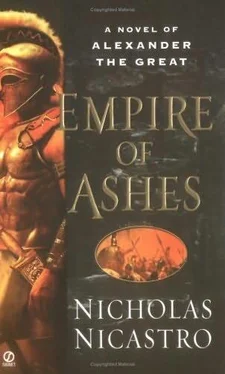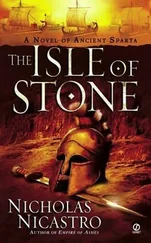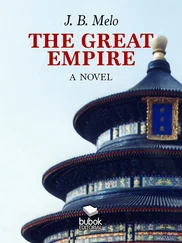Nicholas Nicastro - Empire of Ashes - A Novel of Alexander the Great
Здесь есть возможность читать онлайн «Nicholas Nicastro - Empire of Ashes - A Novel of Alexander the Great» весь текст электронной книги совершенно бесплатно (целиком полную версию без сокращений). В некоторых случаях можно слушать аудио, скачать через торрент в формате fb2 и присутствует краткое содержание. Жанр: Исторические приключения, на английском языке. Описание произведения, (предисловие) а так же отзывы посетителей доступны на портале библиотеки ЛибКат.
- Название:Empire of Ashes: A Novel of Alexander the Great
- Автор:
- Жанр:
- Год:неизвестен
- ISBN:нет данных
- Рейтинг книги:4 / 5. Голосов: 1
-
Избранное:Добавить в избранное
- Отзывы:
-
Ваша оценка:
- 80
- 1
- 2
- 3
- 4
- 5
Empire of Ashes: A Novel of Alexander the Great: краткое содержание, описание и аннотация
Предлагаем к чтению аннотацию, описание, краткое содержание или предисловие (зависит от того, что написал сам автор книги «Empire of Ashes: A Novel of Alexander the Great»). Если вы не нашли необходимую информацию о книге — напишите в комментариях, мы постараемся отыскать её.
Empire of Ashes: A Novel of Alexander the Great — читать онлайн бесплатно полную книгу (весь текст) целиком
Ниже представлен текст книги, разбитый по страницам. Система сохранения места последней прочитанной страницы, позволяет с удобством читать онлайн бесплатно книгу «Empire of Ashes: A Novel of Alexander the Great», без необходимости каждый раз заново искать на чём Вы остановились. Поставьте закладку, и сможете в любой момент перейти на страницу, на которой закончили чтение.
Интервал:
Закладка:
Instead of begging for his life, the Arab merely smiled and made a cutting gesture across his own throat. Impatient, exhausted in body and spirit, Alexander exploded at this insolence. “You count on death, but by the gods your pride has earned you worse!”
With that, he summoned a chariot. Batis’s ankles were pierced between the bone and the tendon (which broke his silence), and looped through with a rawhide strap. The ends of the strap were then attached to the back of the car. Alexander stood over Batis as the man writhed on the ground, quoting Homer to him:
Hector’s body lashed to the car, dragging the head
Mounted Achilles lofted his shining arms
Lashed the strong horses to flight, so they sped
Through the dust of Illium he raised
By Hector’s black hair spread upon the ground-
Unlike Achilles, Alexander did not mount the car, but just slapped the lead horse to start him on his way. All watched, curious, as the chariot raced off toward the sea, Batis’s head carving a bloody furrow in the shell-strewn dust. Some time later riders went out to retrieve the chariot. The man’s remains were not buried, but left for the crabs to devour.
The end of Batis may seem cruel to us. Alexander, too, was often given to merciful treatment of worthy enemies, as I will later relate. The one thing he could not abide, however, was the presumption of arrogance by beaten men. If nothing else, he would teach humility to all the Persians. Some critics, Demosthenes among them, have made much of Alexander’s supposed descent into oriental despotism, pointing to Batis’s death as a notable example. But there is nothing about this execution that smacks of the barbarians. Indeed, I say the opposite: it was Homeric, which we may agree is as Greek as it gets!
It is one of the imponderables of this campaign that it was the fall of Gaza, not Tyre, that made Alexander’s name throughout the world. That such a well-protected city was reduced so fast, in less than two months, at last established that mere walls were no defense against him. There were sieges to come, to be sure, but in the years to come all the large cities just opened their gates to him. His name alone made walls moot.
Egypt agreed with the young king. Having millennia of experience in investing weak characters in the trappings of godhood, the Egyptians had become most accomplished in their sycophancy. Not that Alexander was the least worthy of their flattery-on the contrary, he was every inch the gallant conqueror, as young and winning as the old Persian satrap had been cowardly and rapacious. For the reasons I described earlier, when he left the oracle at Siwah he was as convinced of his divinity as I had ever seen him. Cash and favors poured from him like wet from the Nile. Emissaries from all over the world came to pay him homage, or to beg his indulgence in settling their petty disputes. In short, from the time he rejoined his army for the march to Damascus, until he took possession of Babylon, he was much the hero that Aeschines described. This was a period of less than a year.
At the ancient capital of Memphis he held court, feasting the local nobles and regaling them with the finest poets and musicians from Athens. He sponsored a program of athletic contests on the plain of Giza. At the end of the day, he climbed up the highest Pyramid, that of Cheops, and surveyed the sweep of his new province. To a mind determined to confront all obstacles, the linearity of Egypt, thrusting so grandly into the heart of Africa, was a tonic.
Sailing up to Egyptian Thebes, he was welcomed at Karnak like its long-lost master. Dressed in flawless white linen, he strode down the aisle of the great Hypostyle Hall between throngs of plaited, intoning priests. He entered the sanctum alone, to gaze at the very image of the god Ammon recumbent in His golden pavilion. The next day he took the double crown of Upper and Lower Egypt on his head, and was called Horus, Horus-of-Gold, He-of-the-Sedge-and-the-Bee and the Son of Ra. By the end of the ceremony the Egyptians unveiled a likeness of their new pharaoh: a colossus in black basalt, enthroned with the crook and the flail. This impressed Alexander, as the carving of this statue must have begun well before he entered the country. It is in the nature of the Egyptians to think of everything.
Here I must turn aside from my story to dispute how Aeschines has portrayed my conduct in Egypt. He makes special reference to a report I sent to the archon Nicetes, and proceeds completely to misunderstand the substance of it. By the orders of the Assembly I was duty-bound to report what I saw in Alexander’s company, whether it flattered him or not. Therefore, if I observe that the King’s troops laughed at him behind his back when he put on Egyptian garb, it is because that is what I saw! Would Aeschines prefer that I mislead the Assembly? Likewise, I did write that Alexander’s enthusiasm for barbarian finery was a weakness in his character, and that this weakness might someday lead him into trouble. Given subsequent events, was this anything less than the unvarnished truth?
Recall at this time that King Agis of Sparta approached this city with an offer of alliance against Macedon. The Athenians refused, which was fortunate for us, as Agis’s revolt was defeated by Antipater on the plains of Megalopolis. To those who longed for an end to Macedonian hegemony, my reports of Alexander’s defects gave the virtue of patience: if the young king would ultimately destroy himself, why risk the very existence of our state on Agis’s hopeless cause? In this way, what I learned was of direct benefit to you all. Note that this doesn’t mean I sought to destroy Alexander myself! If that was my object, I could have stuck a dagger in his heart on any one of a thousand occasions. So I ask you again, how have I served my city wrongly?
Returning to the Delta, the new pharaoh turned west, toward the great oasis of Siwah. He announced that it was his intention to consult the god Ammon at his sanctuary, as his ancestors Heracles and Perseus had before him. Taking a small force of two hundred hypaspists, Hephaestion, Aristander and myself included, he started along the coast, skirting Lake Mareotis. On the way he paused at a site he perceived to be an ideal spot for a new city, situated on sloping ground between the lake and the sea. Perhaps inspired by his experience at Tyre, he foresaw how a mole running out to the Pharos island would afford deep, calm anchorage. Anyone with a particle of ambition would already have exploited the site, declared Alexander, except that the Pharaohs of old had never thought any other land worth conquering, and so never built a true seaport from which to rule.
He was so impatient to see his perfect foundation realized that he immediately began surveying the site. Marching ahead of his secretaries, he dictated the future locations of the temples, the marketplace, and the palace; to compensate for the lack of high landmarks in the area, he left instructions that a lighthouse exactly one stade tall be constructed on the island to guide ships into the port. To be sure, nothing of the kind had ever been built before, but none doubted that Alexander would see it done.
His clerks fretted that they had no surveying equipment with them, so they could not record the King’s wisdom. Alexander commanded his men to use the flour in their packs to mark the boundaries. The Egyptians warned against this, as the flour would be necessary for the difficult journey across the desert to Siwah. Alexander ignored them, using every bit of grain to lay out the capital’s walls and streets. When he was done, he looked with satisfaction at his design, until a great flock of seagulls arrived and began to eat his city. He deployed his troops to drive away the birds, but it was too late: the lines of flour were trampled by thousands of little feet.
Читать дальшеИнтервал:
Закладка:
Похожие книги на «Empire of Ashes: A Novel of Alexander the Great»
Представляем Вашему вниманию похожие книги на «Empire of Ashes: A Novel of Alexander the Great» списком для выбора. Мы отобрали схожую по названию и смыслу литературу в надежде предоставить читателям больше вариантов отыскать новые, интересные, ещё непрочитанные произведения.
Обсуждение, отзывы о книге «Empire of Ashes: A Novel of Alexander the Great» и просто собственные мнения читателей. Оставьте ваши комментарии, напишите, что Вы думаете о произведении, его смысле или главных героях. Укажите что конкретно понравилось, а что нет, и почему Вы так считаете.












